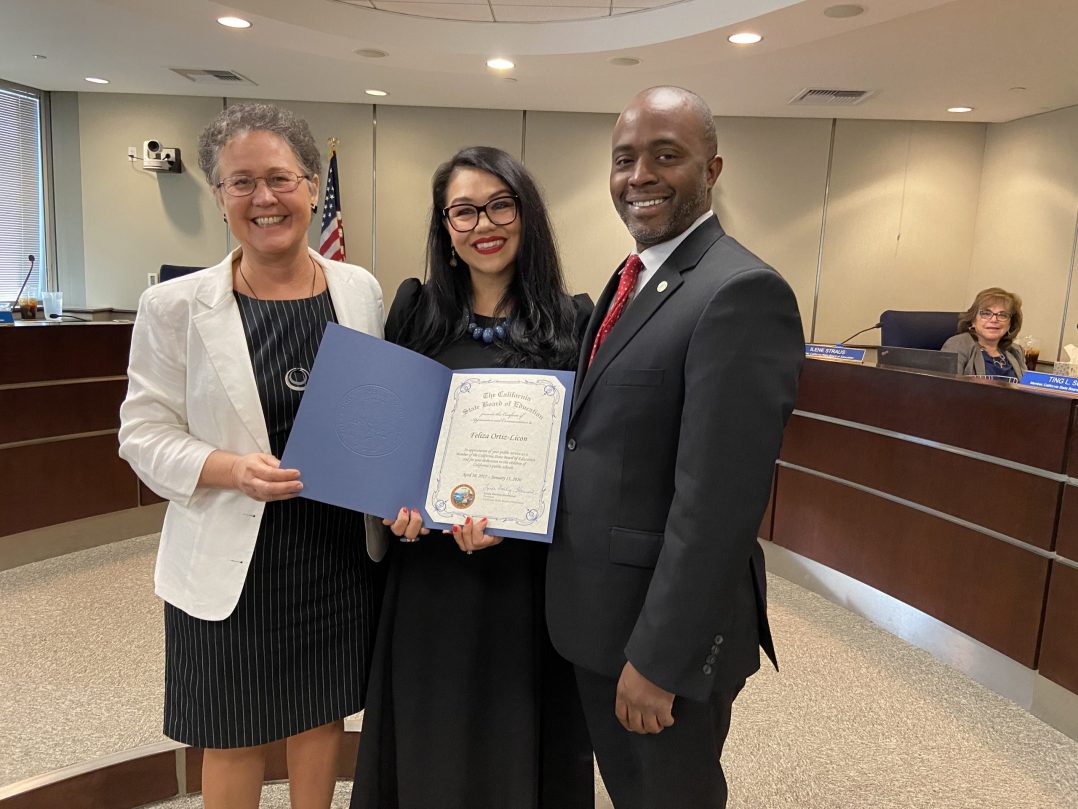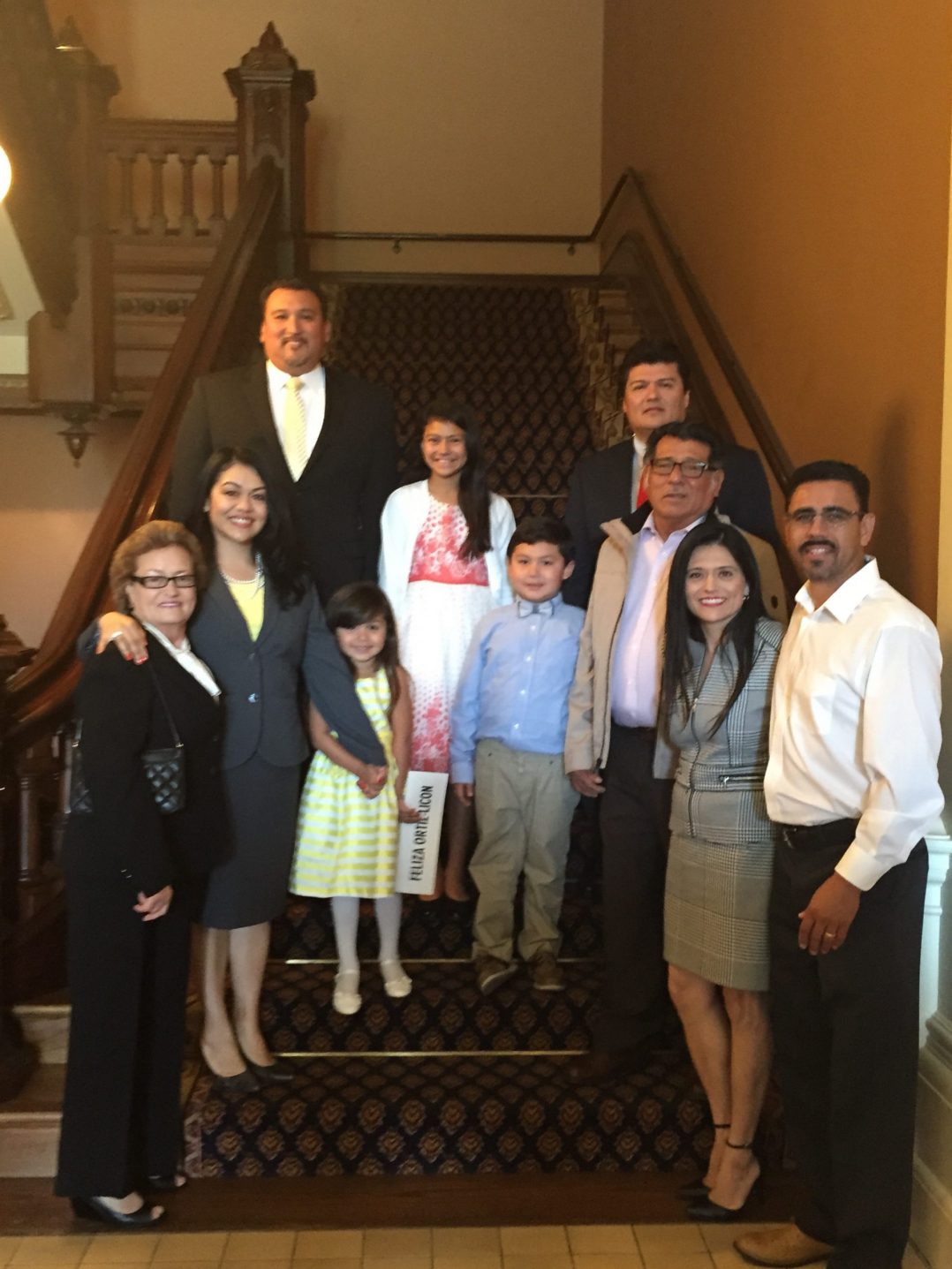¡Presente!
Reflections of a Latina State Board Member

This blog first ran on the blog site for Latinos for Education.
Author Dr. Feliza Ortiz-Licon is UnidosUS’s Principal of Education Programs. In 2015, Feliza was appointed by Governor Jerry Brown to the California State Board of Education where she served a five-year term.
“If they don’t give you a seat at the table, bring a folding chair.” Shirley Chisholm’s call to action has resonated with me since my days as a young Chicana activist. As the daughter of working-class Mexican immigrants, my humble beginnings did not guarantee me a seat at most tables – certainly not those entrusted with decision-making powers. That, however, changed on May 6, 2015 when I was sworn in as a Board Member to the California State Board of Education (SBE) to serve 6.2 million students and their families. Fifty-three percent (53%) of all students in California are Latinx, yet I served most of my five-year term as the only Latina appointed to this 11-member policy-making body. The opportunity to serve my community on this scale and in this capacity was an honor and privilege coupled with a sense of responsibility to help correct historical wrongs that have disproportionately impacted communities of color, immigrants, and English learners.

In true Latino fashion, I arrived at the California Department of Education (CDE) for my first Board meeting and swear-in ceremony with an entourage of six family members; this would be topped one year later at my Senate confirmation hearing before the Senate Rules Committee when 18 family members and friends attended. Until then, I was relatively unknown in Sacramento given that my work in education with UnidosUS (formerly the National Council of La Raza), has unfolded at the national level within an Affiliate network. While the swear-in ceremony lasted less than five-minutes, my entrance to the Board Room and my description of the ceremony as my “professional quinceañera,” served to define me and my values from the start of my tenure. I belonged to a village, was grounded in colectivismo (by many for many), my culture mattered, and my lived experiences would be my greatest policy-making asset.

At the time of my appointment by Governor Jerry Brown, our family truly represented the educational trifecta of parent, practitioner, and policymaker. My children were enrolled in pre-Kinder and Kindergarten; my husband was closing his seventeenth year of teaching in elementary education. This tri-lens approach would prove beneficial as I considered policy recommendations and their impact upon implementation. But first, I had to familiarize myself with policies that were adopted prior to my appointment, get acquainted with the new policies, in particular the state’s Local Control Funding Formula (LCFF) aimed at “increasing or improving” the outcomes of low-income students, English learners and foster care students along with the federal Every Student Succeeds Act (ESSA) which required the adoption of a state plan and the development of the State’s accountability system. To be an effective board member, I had to quickly learn the culture of the State Board of Education, the SBE’s relationship with the CDE, the Legislature, and statewide advocacy organizations; I also wanted to use this time to define myself and the value-added of my appointment to the SBE.
But I was not given an opportunity to define myself on my own terms. I was quickly identified as an “advocate” instead of an educator, which is how I have always summarized my professional experience at the national, state, and local levels. Eventually, I learned to “own” this space and redefine the term “advocate” to mean someone with a deep commitment toward equitable policies aimed at supporting the most marginalized students within the public-school system. After all, shouldn’t we all be advocates for children? But I must admit that I never anticipated the emotional labor that would be invested in this role and this “advocacy.” When you grow up poor, attending under-resourced schools, and living in neglected communities, a quality education gives you the best opportunity to defy the predictive models that would render you another statistic. The stakes were high, and I felt the pressure to magnify the needs of my community while giving voice and visibility to the issues that can only be tangible when they form part of your lived experiences. Once I was able to overcome a deep sense of imposter syndrome and use my platform in the service of others, I encountered an interesting dilemma which I refer to as La Goldilocks dilemma; one in which I was deemed too progressive for some stakeholders and too moderate for others. I had to learn to live comfortably in this dilemma or risk losing my moral compass.

During my tenure on the California State Board of Education, I learned that it was crucial to build relationships with colleagues to address issues impacting students of color. Afterall, these issues of inequity were not created by us. The widening achievement and opportunity gaps, disproportionality in suspensions, culturally void curricula, and other microaggressions experienced at the school site level, are vestiges of institutional racism, structural inequalities, and discriminatory policies. We did not create these conditions, so we should not be the only ones held responsible for addressing them. We need to create alliances and coalitions to address inequities and institutionalize our understanding about equity. I also learned that representation matters; our gente felt an enormous sense of pride and comfort when they walked into an intimidating Board room and were validated by a smile, a Spanish phrase, and a nod of acknowledgment. Finally, I learned that you can vacate a position without leaving the work; after all, the work of equity is not term-bound. Today more than ever, our students and familias need our advocacy, expertise, and representation. Are you ready to serve them? If so, join me in saying “¡Presente!”


